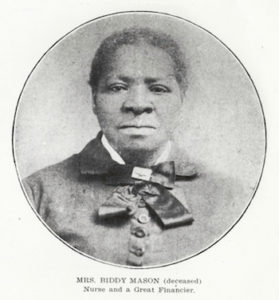
Biddy Mason
*On this date in 1818, Bridget "Biddy" Mason was born. She was a Black slave woman who worked as a nurse/midwife.
She was born in Mississippi on a plantation owned by Robert Marion Smith and Rebecca (Crosby) Smith. In 1847, they became Mormon converts. During her teenage years, she learned domestic and agricultural skills. Additionally, she developed skills in herbal medicine and midwifery, which were taught to her by other female slaves. Her knowledge benefited both the slaves and the plantation owners. Biddy was either given to or sold to her owners in the 1840s. She was valuable to the Smiths because of her knowledge of medicine, child care, and livestock care.
Once illiterate, she walked from Mississippi to California to become a successful entrepreneur and a generous contributor to social causes. She moved to the Utah Territory with his household and slaves, where Brigham Young was starting a Mormon community.
Mason was responsible for herding the cattle in this strenuous two-thousand-mile cross-country trek. She prepared meals, was a midwife, and cared for her children. In 1851, Smith moved his household again, this time to San Bernardino, California. Smith probably did not know that California had been admitted to the Union in 1850 as a free state and that slavery was forbidden there.
At this time, she had made friends in the Southern California Black community, and one of them (Charles Owens) helped Mason petition the court and, in 1856, won freedom for herself and her daughters. She moved to Los Angeles and found employment as a nurse and midwife. Her hard work and nursing skills allowed her to become economically independent. She became a domestic to Dr. John S. Griffin, serving most of the Los Angeles area. Mason was also very frugal, and only ten years after gaining her freedom, she bought property on Spring Street for $250, becoming one of the first Black women to own land in Los Angeles.
This site is now in the center of the commercial district in the heart of the city. In 1884, she sold a parcel of the land for $1500 and built a commercial building with spaces for rental on the remaining land. She continued making wise decisions in her business and real estate transactions, and her financial fortunes continued to increase until she accumulated a wealth of almost $300,000. Her grandson, Robert Curry Owens, a real estate developer and politician, was the wealthiest black man in Los Angeles at one time.
Mason was a founding member of the First African Methodist Episcopal Church in 1872. She also gave generously to various charities and provided food and shelter for the poor of all races, and she never forgot the jail inmates whom she visited often. Biddy Mason died January 15, 1891, and was buried in an unmarked grave at Evergreen Cemetery in the Los Angeles Boyle Heights area. Nearly a century later, on March 27, 1988, a tombstone was unveiled, marking her grave for the first time in a ceremony attended by Mayor Tom Bradley and about three thousand First African Methodist Episcopal church members.
Also, November 16, 1989, was declared Biddy Mason Day. Her achievements were memorialized at the Broadway Spring Center between Spring Street and Broadway at Third Street in Los Angeles.
Epic Lives: One Hundred Black Women Who Made a Difference,
edited by Jessie Carney Smith, Oscar L. Sims
Visible Ink Press, 1993.